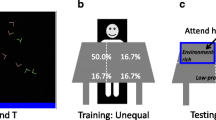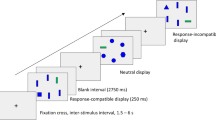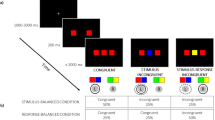Abstract
Stimulus over-selectivity describes a phenomenon where only a subset of the relevant stimuli present in the environment, control an individual’s behavior. The current experiment explored the degree to which over-selectivity increases in old age. The level of over-selectivity in a visual discrimination task in 60 individuals aged 60–89 years was assessed, as well as the degree to which this reflected attentional control. In addition, the intellectual functioning and cognitive flexibility of the participants were assessed. Results showed that, as age increased, three effects were revealed: levels of stimulus over-selectivity increased, IQ scores decreased, and cognitive flexibility decreased. However, over-selectivity was not related to IQ or cognitive flexibility, and appeared related most to attentional impairments. Thus, ageing is related to significant declines in effective stimulus control. These effects can have a serious impact on the physical and psychological health of old adults, as well as their quality of life, and, therefore, this area of research warrants further exploration. The results are discussed in relation to the attention-deficit and comparator theory of over-selectivity.




Similar content being viewed by others
References
Bailey SL (1981) Stimulus over selectivity in learning disabled children. J Appl Behav Anal 14:239–248. doi:10.1901/jaba.1981.14-239
Brayne C, Gill C, Huppert FA, Barkley C, Gehlhaar E, Girling DM, O’Connor DW, Paykel ES (1995) Incidence of clinically diagnosed subtypes of dementia in an older population. Cambridge Project for Later Life. Br J Psychiatry 167:255–262
Broomfield L, McHugh L, Reed P (2010) Factors impacting emergence of behavioral control by underselected stimuli in humans after reduction of control by overselected stimuli. J Exp Anal Behav 94:125–133. doi:10.1901/jeab.2010.94-125
Chao LL, Knight RT (1997) Prefrontal deficits in attention and inhibitory control with aging. Cereb Cortex 7:63–69
Dube WV (2009) Stimulus overselectivity in discrimination learning. In: Reed P (ed) Behavioral theories and interventions for autism. Nova Science Publishers, New York, pp 23–46
Dube WV, McIlvane WJ (1999) Reduction of stimulus over selectivity with nonverbal differential observing responses. J Appl Behav Anal 32:25–33. doi:10.1901/jaba.1999.32-25
Dube WV, Lombard KM, Farren KM, Flusser D, Balsamo LM, Fowler TR (1999) Eye tracking assessment of stimulus over selectivity in individuals with mental retardation. Exp Anal Hum Behav Bull 13:267–271
Fabio RA, Giannatiempo S, Antonietti A, Budden S (2009) The role of stereotypies in overselectivity process in Rett syndrome. Res Dev Disabil 30:136–145
Feeney S (1972) Breadth of cue utilization and ability to attend selectively in schizophrenics and normals. (Doctoral dissertation). University of California, Los Angeles
Finucane ML, Alhakami A, Slovic P, Johnson SM (2000) The affect heuristic in judgments of risks and benefits. J Behav Decis Mak 13:1–17
Finucane ML, Mertz CK, Schmidt ES (2005) Task complexity and older adults’ decision-making competence. Psychol Aging 20:71–84
Folstein MF, Folstein SE, McHugh PR (1975) “Mini-mental state”. A practical method for grading the cognitive state of patients for the clinician. J P Psychiatr Res 12:189–198. doi:10.1016/0022-3956(75)90026-6
Frankel F, Simmons JQ, Fichter M, Freeman BJ (1984) Stimulus overselectivity in autistic and mentally retarded children: a research note. J Child Psychol Psychiatry 25:147–155
Gard T, Hölzel BK, Lazar SW (2014) The potential effects of meditation on age-related cognitive decline: a systematic review. Ann N Y Acad Sci 1307:89–103
Grant DA, Berg E (1948) A behavioral analysis of degree of reinforcement and ease of shifting to new responses in Weigl-type card-sorting problem. J Exp Psychol 38:404–411
Hill EL (2004) Evaluating the theory of executive dysfunction in autism. Dev Rev 24:189–233. doi:10.1016/j.dr.2004.01.001
Hsieh PC, Yeh TL, Lee IH, Huang HC, Chen PS, Yang YK, Liao M (2010) Correlation between errors on the Wisconsin Card Sorting Test and the availability of striatal dopamine transporters in healthy volunteers. J Psychiatry Neurosci 35:90–94. doi:10.1503/jpn.090007
Kelly MP, Leader G, Reed P (2015) Stimulus over-selectivity and extinction-induced recovery of performance as a product of intellectual impairment and autism severity. J Autism Dev Disord 45:3098–3106. doi:10.1007/s10803-015-2466-x
Koegel RL, Wilhelm H (1973) Selective responding to multiple cues by autistic children. J Exp Child Psychol 15:442–453. doi:10.1016/0022-0965(73)90094-5
Leader G, Loughnane A, Mc Moreland C, Reed P (2009) The effect of stimulus salience on over-selectivity. J Autism Dev Disord 39:330–338. doi:10.1007/s10803-008-0626-y
Lovaas OI, Schreibman L, Koegel R, Rehm R (1971) Selective responding by autistic children to multiple sensory inputs. J Abnorm Psychol 7(77):211–222. doi:10.1037/h0031015
Matzel LD, Schachtman TR, Miller RR (1985) Recovery of an overshadowed association achieved by extinction of the overshadowing stimulus. Learn Motiv 16:398–412. doi:10.1016/0023-9690(85)90023-2
McHugh L, Reed P (2007) Age trends in stimulus overselectivity. J Exp Anal Behav 88:369–380. doi:10.1901/jeab.2007.88-369
McHugh L, Simpson A, Reed P (2010) Mindfulness as a potential intervention for stimulus over-selectivity in older adults. Res Dev Disabil 31:178–184
Park DC (2000) Medication adherence: is and why is older wiser? J Am Geriatr Soc 48:458–459, Letter to the editor
Ploog BO (2010) Stimulus overselectivity four decades later: a review of the literature and its implications for current research in autism spectrum disorder. J Autism Dev Disord 40:1332–1349. doi:10.1007/s10803-010-0990-2
Reed P (2007) Comparator deficits in autism during discrimination learning: theory to treatment. In: Carlisle PC (ed) Progress in autism research. Nova Science Publishers, Inc, New York, ISBN: 978-1-60021-630-5
Reed, P. (2011). Comparator mechanisms and autistic spectrum conditions. In. T.R. S Schachtman& S.R. Reilly (Eds.), Associative Learning and Conditioning: Human and Animal Applications. Oxford University Press.
Reed P, Gibson E (2005) The effects of concurrent task load on stimulus overselectivity. J Autism Dev Disord 35:601–614. doi:10.1007/s10803-005-0004-y
Reed P, McCarthy J (2012) Cross-modal attention-switching is impaired in autism spectrum disorders. J Autism Dev Disord 42:947–953. doi:10.1007/s10803-011-1324-8
Reed P, Broomfield L, McHugh L, McCausland A, Leader G (2009) Extinction of overselected stimuli causes emergence of underselected cues in higher-functioning children with autistic spectrum disorders. J Autism Dev Disabil 39:290–298. doi:10.1007/s10803-008-0629-8
Reed P, Savile A, Truzoli R (2012) Event related potential analysis of stimulus over-selectivity. Res Dev Disabil 33:655–662
Reynolds G, Reed P (2011a) Effects of schedule of reinforcement on over-selectivity. Res Dev Disabil 32:2489–2501. doi:10.1016/j.ridd.2011.07.011
Reynolds G, Reed P (2011b) The strength and generality of stimulus over-selectivity in simultaneous discrimination procedures. Learn Motiv 42:113–122. doi:10.1016/j.lmot.2010.12.001
Reynolds G, Watts J, Reed P (2012) Lack of evidence for inhibitory processes in over-selectivity. Behav Process 89:14–22. doi:10.1016/j.beproc.2011.09.008
Smeets PM, Hoogeveen FR, Striefel S, Lancioni GE (1985) Stimulus o overselectivity in TMR children: establishing functional control of simultaneous multiple stimuli. Anal Interv Dev Disabil 5:247–267. doi:10.1016/0270-4684(85)90014-X
Solomon M, Smith AC, Frank MJ, Ly S, Carter C (2011) Probabilistic reinforcement learning in adults with autism spectrum disorders. Autism Res 4:1–12
Tales A, Porter G (2008) Visual attention-related processing in Alzheimer’s disease. Rev Clin Gerontol 18:229–243
Tales A, Bayer AJ, Haworth J, Snowden RJ, Philips M, Wilcock G (2011) Visual search in mild cognitive impairment: a longitudinal study. J Alzheimers Dis 24:151–160
Traykov L, Raoux N, Latour F, Gallo L, Hanon O, Baudic S, Rigaud AS (2007) Executive functions deficit in mild cognitive impairment. Cogn Behav Neurol 20:219–224
Wayland S, Taplin JE (1982) Nonverbal categorisation in fluent and non-fluent anomic aphasics. Brain Lang 16:87–108
Wechsler D (2008) Wechsler Adult Intelligence Scale—fourth edition. Pearson: San Antonio, Texas
White KG, Ruske AC (2002) Memory deficits in Alzheimer’s disease: the encoding hypothesis and cholinergic function. Psychon Bull Rev 9:426–437
Wilhelm H, Lovaas OI (1976) Stimulus over selectivity: a common feature in autism and mental retardation. Am J Ment Defic 81:26–31
Wilkie DM, Masson ME (1976) Attention in the pigeon: a re-evaluation. J Exp Anal Behav 26:207–212. doi:10.1901/jeab.1976.26-207
Author information
Authors and Affiliations
Corresponding author
About this article
Cite this article
Kelly, M.P., Leader, G. & Reed, P. Factors producing over-selectivity in older individuals. AGE 38, 63 (2016). https://doi.org/10.1007/s11357-016-9926-x
Received:
Accepted:
Published:
DOI: https://doi.org/10.1007/s11357-016-9926-x




